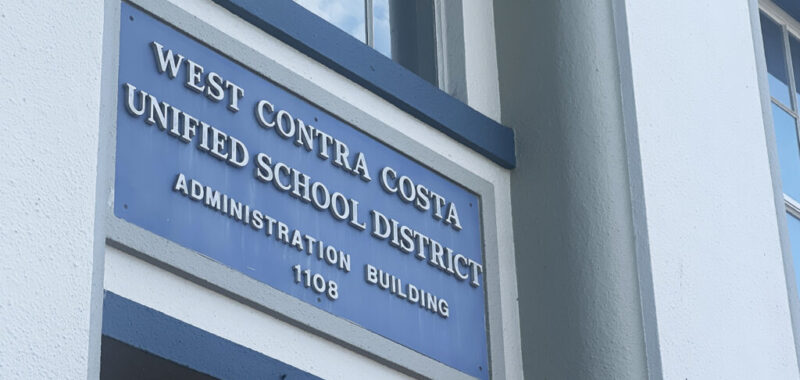
West Contra Costa Unified School District administration building.
Credit: Louis Freedberg / EdSource
For the first time in five years, the West Contra Costa school district board of trustees has denied a renewal petition of one of its charter schools.
By a unanimous vote during its meeting on Wednesday, the board rejected the renewal application of the Richmond Charter Academy, which serves just under 300 students.
It is part of Amethod Public Schools, or AMPS, a charter management organization which also operates two other charter schools in Richmond and three in Oakland.
The vote followed impassioned appeals by staff and students wearing yellow T-shirts, trying to persuade the board to allow the school to continue operating.
A similar hearing about the school’s fate was held at a board meeting last month. There are 13 charter schools in the district, serving close to 4,000 students of the district’s nearly 30,000 students.
The charter schools are among more than 1,300 in California, by far the largest number in any state.
Renewal petitions are rarely denied in California. The Legislature approved a new law (Assembly Bill 1505) in 2019 governing charter school applications and renewals, but its full implementation was delayed until after the pandemic. As a result, many charters are just now coming up for renewal under the 2019 law.
The board’s decision was not entirely unexpected. It was based on a very strong recommendation by district staff, outlined in a detailed 79 page report that the district deny the school’s charter based on major concerns about its finances, and its ability to guarantee that it could offer the educational programs it was promising.
The staff reviewers said they “found fiscal concerns that could not be remedied and the school would not likely implement the program as described in the petition.”
The denial came despite students showing academic results somewhat higher than the average results for the district.
Beyond fiscal concerns, several board members nonetheless expressed great concern about the small number of Black students in the school.
The school has a 91 percent enrollment of Latino students, while Black students only made up 4 percent. That’s in a district with an 11.5 percent black enrollment.
School administrators said that the school admitted students based on a lottery – and thus the racial or ethnic make up the school was determined by who applied.
The school now has the opportunity to appeal the denial to the county school board, and if they too deny the renewal, it could then appeal to the State Board of Education.
Among the issues identified in the staff report were the very low number of teachers with a “clear” teaching credential.
Another concern was that there has been considerable turnover in leadership. Some board members had high praise for the current interim CEO Adrienne Barnes. But in light of leadership turnover in the past few years, they said they weren’t confident that the current leadership will stay any longer.
“Ms. Barnes, you have made a Herculean leap forward, and I appreciate your efforts,” board president Leslie Reckler told her at the meeting. “But I have deep concerns over whether you’re going to be here in a year, or even or even less than that.”
In 2020, the board voted not to renew the application of the Manzanita Elementary charter school, despite a staff recommendation that the application be approved. The school then appealed to the County Board of Education, which overruled the school board. Manzanita is still operating today.
None of the current board members were on the board when it took its 2020 vote. Reckler and Demetrio Gonzalez-Hoy, the two most senior current members of the board, pointed out that this was the first time they had voted against a charter renewal, and that it was a difficult vote to cast.
“As the people in charge of renewing the charter, I simply cannot do that,” Gonzalez-Hoy said. “I am sorry for that because I know how painful this is. And as the first charter that I have to deny, I feel the pain.”
“The staff’s findings raise serious questions that we cannot ignore, and it would be irresponsible to move forward without addressing them fully,” added board member Gaudalupe Enllana in explaining her vote. “My decision is not made lightly, but it’s made with students at the center because that is who we are here to serve.”

